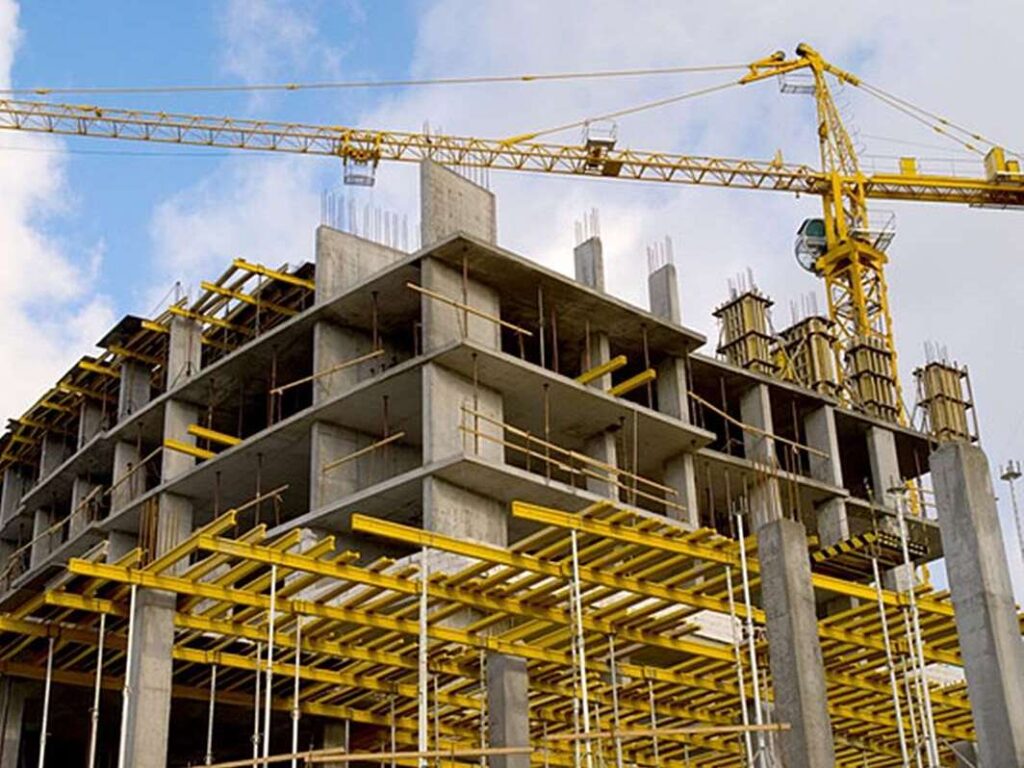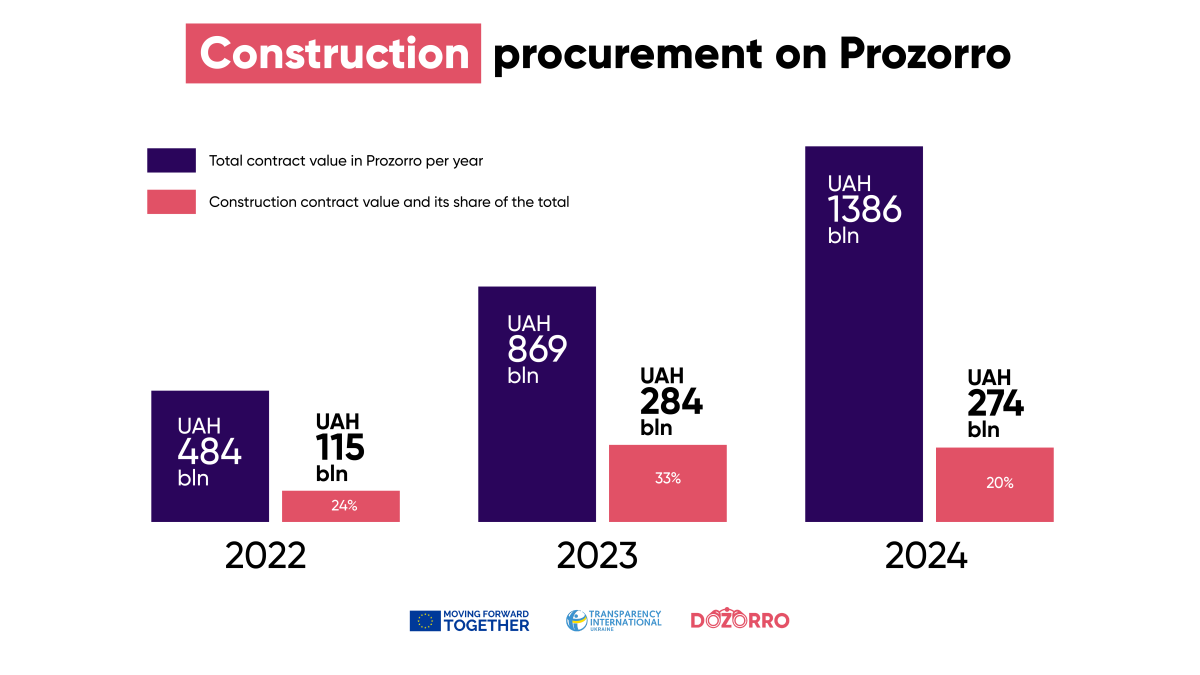

At DOZORRO, we’ve been monitoring reconstruction efforts since the start of the full-scale invasion, recognizing this sector as one of the most vulnerable to abuse. On the one hand, the large sums of money involved and the urgency of reconstruction create fertile ground for abuse. According to BI Prozorro, construction tenders account for nearly a third of the total value of public procurement contracts. Second only to defense procurement.
Meanwhile, the latest World Bank estimates place the cost of recovery and reconstruction in Ukraine at $524 billion. And with continued attacks by Russia, that number increases daily.
However, the state struggles to provide effective oversight of these procurement transactions. In fact, the main supervisory body in the field of public procurement — the State Audit Service — has no authority to verify whether the prices of materials in construction tenders match market rates. As a result, civil society and journalists remain the only actors consistently monitoring for overpricing. Yet only law enforcement agencies can hold those responsible accountable. And even then, only after the fact, by identifying inflated costs in work acceptance certificates.
Over the past year and a half, we have analyzed more than 600 construction tenders with an estimated total value of UAH 52 billion.In every second tender, we found signs of inflated prices, with potential overpayments totaling UAH 1.9 billion. In fact, one out of every thirteen hryvnias in the contracts we reviewed could represent an overpayment.
We alerted procuring entities to these inflated prices and urged them to adjust their contracts accordingly. This is the only available way to prevent overpayments before they occur. In some cases, procuring entities renegotiated the contracts with contractors. However, in most cases, we received the same response: the contractor’s bid did not exceed the estimated contract value, which had been determined based on the approved project cost estimate that had already passed expert review and received a positive expert opinion. In other words, they claim overpricing is impossible because the prices were already reviewed during the project planning and approval stage. But we clearly see potential overpayments, and they are not mere 10% errors. In many cases, the prices are several times higher than market rates. So something in this price verification process is not working. We decided to take a closer look: what does project documentation expert examination actually entail, and does it involve checking material prices?
How construction procurement works
On Prozorro, procuring construction works is one of the final stages in the overall construction process, far from the first. In fact, the preparatory phase often takes longer than the actual construction. It all begins with the project design brief, which must be developed and approved by a procuring entity. Based on that, the development of project documentation is procured. The selected contractor proposes technical solutions and calculates preliminary construction costs. The project must then undergo expert review and be approved. Only after that can the actual construction tender be announced.
Last year, we wrote that overpricing in construction often originates in the preparatory phase. Specifically, when determining the estimated cost during design and estimate documentation development. Prices in the project are defined by the investment cost estimate, prepared by professional estimators. This estimate includes all major expenses: materials, equipment, labor, contractor profit, and administrative costs. Its quality directly affects transparency and efficiency. However, it is also where corruption risks can be concealed — namely, by inflating prices.
Expert review of project documentation: what it actually checks
Project documentation expert examination is the final step before construction begins. Its main goal is to verify whether the project complies with Ukraine’s building codes and legislation. The review examines the quality of technical solutions, safety, structural integrity, cost estimates, and adherence to occupational safety and fire protection standards. Procuring entities often cite this process when dismissing concerns about inflated prices.
Such expert reviews are carried out by authorized organizations, both public and private. The review process consists of several stages:
- Preparatory stage. The procuring entity determines whether an expert review is required based on the facility’s risk class (СС1, СС2, СС3) and selects an expert organization.
- Project review. Experts examine various aspects, perform calculations, and check compliance with current regulations.
- Conclusion and report. The expert organization issues an opinion — positive if the project meets legal requirements and any issues were promptly resolved, or negative if violations were too serious to correct.
- Final opinion and completion of the expert examination. Once all issues are resolved (if necessary), a final expert opinion is issued. This document forms the basis for project approval and construction permit issuance.
How the review assesses cost estimates
So, we know the expert review includes an assessment of the cost estimate. But what exactly does it check?
Two documents define the legal framework for expert reviews:
- Procedure for approving construction projects and conducting their expert review.
- DSTU 8907:2019 — Guidelines for the organization of inspection for project documentation for construction.
However, neither document explicitly requires a review of building material prices (inclusive but not limited to conformity with average market prices). The expert organization assesses the overall justification of expenditures but does not verify specific material prices.
The consequences are straightforward and predictable: if a project includes inflated prices, they are likely to carry over into the expected contract value. In the end, this leads to overpayments and inefficient use of public funds.
Who is responsible for pricing?
The Guidelines for Determining Construction Costs is the key document governing pricing. It states that current prices in the cost estimate are set by the procuring entity or its authorized representative (typically the project developer). In other words, the procuring entity is responsible for ensuring prices are reasonable.
The same Guidelines also require the procuring entity to establish a procedure for analyzing material costs and to ensure they do not exceed average regional monthly prices.
However, only a few entities have such procedures in place. In reality, this requirement remains largely formal, and there is no liability for failing to perform the analysis or for doing it poorly.
How to prevent inflated cost estimates
The cost component of the project documentation review is a crucial control point in construction spending. Yet, without a mechanism to verify prices against market rates, it cannot prevent inflated estimates. Unless legislation is amended, this issue will remain a major threat to Ukraine’s reconstruction efforts. We will continue documenting overpricing in construction tenders.
Still, fixing the problem won’t be easy — it requires a comprehensive solution. Simply mandating that expert organizations check prices is not enough. There must be a unified approach: how to calculate average market prices, how to compare project prices with benchmarks, and how to hold parties accountable for failing to conduct or properly perform such analysis.
Potential steps might include:
- Legally defining the concept of “average market price” and establishing a standard methodology for calculating it.
- Creating an open and unified database of building material prices and introducing a mechanism to require its use in project planning.
- Making it mandatory to verify material prices during the expert review of design and estimate documentation.
The final approach should be decided in consultation with all relevant stakeholders, including procuring entities, expert organizations, professional cost estimators, and developers of construction pricing software. As civil society, we are ready to take part in this process. But the first step must come from the central authority responsible for construction policy — the Ministry for Development of Communities and Territories of Ukraine.
Until this issue is placed on the agenda, the answer to the question of who checks the prices in construction tender cost estimates remains simple: we do.
This material is funded by the European Union. Its content is the sole responsibility of Transparency International Ukraine and does not necessarily reflect the views of the European Union.







